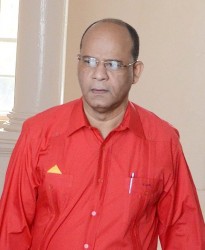In the wake of its observations during the recent disciplined services voting for local government elections, the People’s Progressive Party (PPP) on Thursday said it will push again for legislation to be enacted to stipulate that voters must possess a physical form of national identification.
“We didn’t push [then], we pushing for it now that we are in the opposition… we are taking what is called a dialectical approach to these matters,” General Secretary of the PPP Clement Rohee told a news conference at Freedom House.

The High Court had previously ruled that the use of ID cards as a requirement for voting was unconstitutional and vitiated the 1997 elections as a result.
Complaining bitterly about alleged infractions during Tuesday’s disciple services voting, Rohee said that his party was not comfortable about the use of the Guyana Elections Commission (Gecom) folio, with electors’ particulars including their photographs, solely to verify a voter’s identity as it believes that it is susceptible to fraud.
“The PPP/C repeats its alarm at the high incidence of Disciplined Services (DS) Electors presenting themselves without a National Identification (ID) card for the purposes of voting. It notes that, while the detailed statistics on this phenomenon are being reviewed, the widespread and unusual occurrences of this nature can only serve to undermine the integrity of the polls. While it is still possible to vote after the proper administering of an “Oath of Identity,” the opportunity can be used for electoral fraud by the misdirecting of voters, double and multiple voting by impersonation and collusion, and the slowing down of the process of voting leading to voter frustration and disorder at the polling places,” he said, while reading from a party statement.
Although he did not produce evidence of any fraudulent practices during Tuesday’s voting, he said that the party was reviewing the issue and would mull options to ensure an ID card is used for the purpose of voting.
“The PPP/C remains firmly of the view that voting without an ID card should be a rare exception rather than a new normal situation. Note has also been taken of the seeming failure of Gecom’s voter education efforts, which has incurred enormous expenditures. The party is reviewing this issue, based on the experience of past elections, to require a legislative change which allows for only a valid ID card being presented by an elector for identification for voting,” he added.
Rohee said that he believes the use of the folio as identification was being abused and that by its own calculations, out of only 3,147 persons that voted on Tuesday, some 513 of them used the folio only system.
“You can’t walk in any polling station without any identification because that’s subject to abuse. Some people will be allowed to vote, others will not be allowed to vote. The PPP wants the folio to be used only to match the bio-data on the passports or national identification cards,” he said.
Questioned why his party had not previously pushed for legislation to stipulate the production of an ID card for voting, he said “What is applicable in one situation may not be applicable in another situation.”
Rohee also pointed out other complaints that will be made to Gecom based on its reports from Tuesday’s voting.
He listed the use of “sample ballots, by presiding officers to give example to voters on the voting process, although no advice was sought by voters. “Only on a request being made by an elector for voting advice should explanations by the presiding officers be required,” he said.
The maintainece of the 200 yard boundary line, the colour of Gecom officials’ desk designators and place markers, quality of folio pictures of electors and diversity of Gecom staff were also concerns he said would be raised with Gecom.





